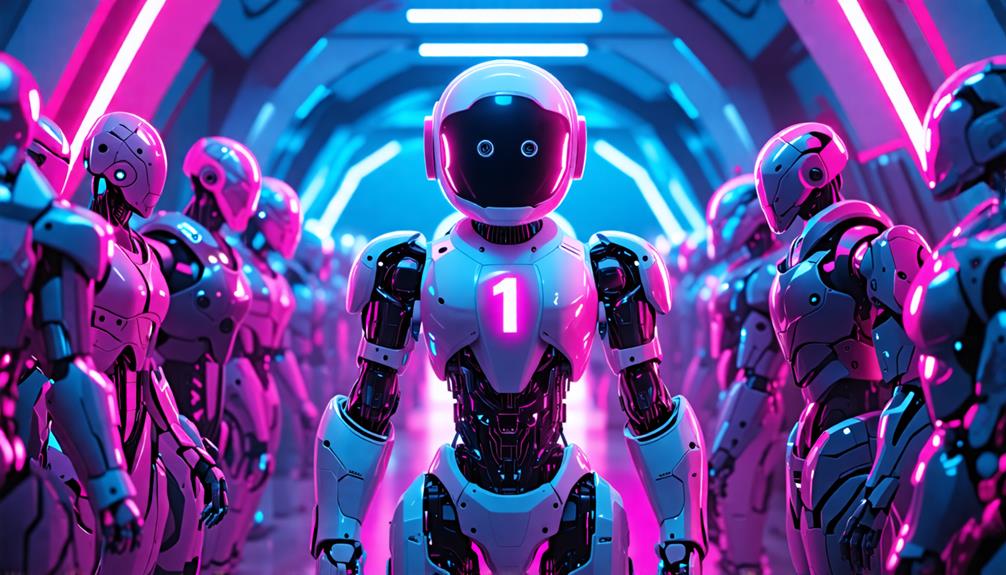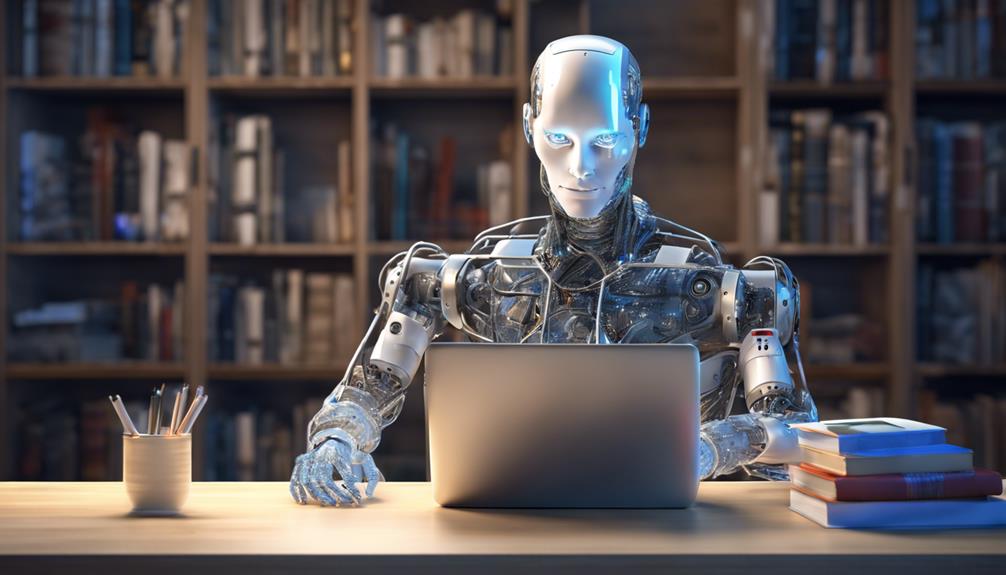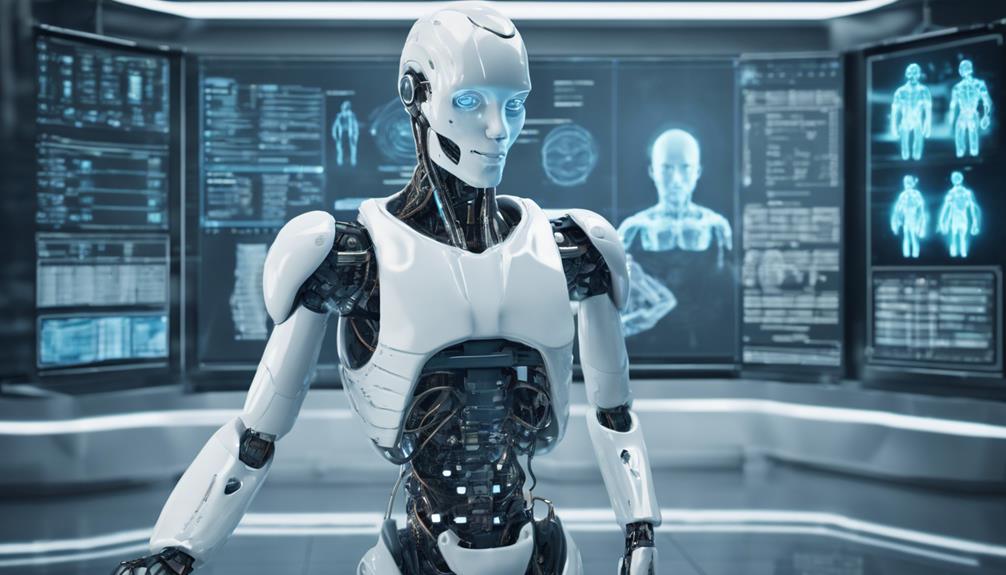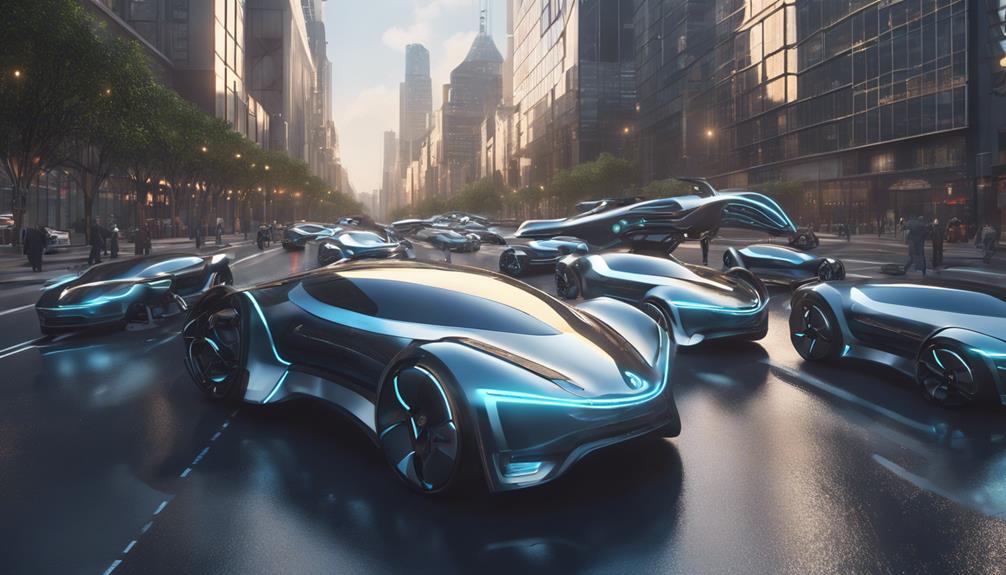
You may be curious about who's leading the race in artificial intelligence. Currently, Google AI stands out as a frontrunner, continuously pushing boundaries in AI research and application. With its profound impact on various fields, including healthcare, autonomous vehicles, and natural language processing, Google AI shapes how AI technologies evolve. Companies like IBM, DeepMind, and OpenAI also significantly contribute to AI advancements, each excelling in distinct aspects of technology. As you explore further, you'll uncover more about how these entities drive the dynamic progress in AI, shaping a future that increasingly relies on intelligent technology.
Defining Artificial Intelligence

Artificial intelligence, or AI, is the field of computer science focused on creating machines that can perform tasks typically requiring human intelligence. You've likely encountered AI in various forms, from voice assistants to recommendation engines on streaming services.
At its core, AI aims to mimic human cognitive functions. It's all about algorithms, or sets of rules that guide AI in making decisions.
When you interact with AI, you're dealing with systems designed to learn from data. These systems, known as machine learning, adjust their behavior based on the information they process. This ability to learn and adapt makes AI incredibly powerful.
For instance, when you shop online, AI algorithms analyze your browsing habits and purchase history to predict what you might buy next.
Another key aspect of AI is natural language processing (NLP). This technology enables AI to understand and generate human language. Whether you're asking your smartphone a question or chatting with a customer service bot, NLP is at work.
Understanding AI isn't just about knowing its functions but recognizing its potential to transform industries. It's not just a tool for automating tasks; it's a versatile technology that enhances human capabilities, making you more efficient in your daily activities and professional tasks.
Historical AI Milestones
Throughout history, several key milestones have shaped the development of AI as you know it today. Let's take a trip back to where it all began.
In the 1950s, the term 'artificial intelligence' was first coined by John McCarthy, launching an era of research and dreams about machines that could mimic human intelligence. You might find it fascinating that by 1956, the first AI program was developed, able to play a game of checkers and improve its performance over time.
Fast forward to the 1990s, you'd see a significant leap with the development of machine learning algorithms, enabling computers to learn from data and make decisions with minimal human intervention. This era marked a shift from hardcoded programming to systems that could adapt and evolve.
In 1997, the world watched in awe as IBM's Deep Blue defeated the reigning world chess champion, Garry Kasparov. It wasn't just a victory in a game; it was a demonstration that machines could outthink humans in complex tasks.
These milestones aren't just historical footnotes. They're the building blocks that have set the stage for the sophisticated AI systems you interact with today. From simple games to complex decision-making, AI's journey is a testament to human ingenuity and endless curiosity.
Leaders in AI Technology

Now, let's explore the current leaders in AI technology, shaping the future of this field.
You've likely heard of giants like Google and IBM, but there are others at the forefront you should know about. DeepMind, acquired by Google, is renowned for innovations in algorithms that mimic human brain functions. Similarly, OpenAI stands out for its ethical approach to AI development, ensuring their technologies don't just advance, but do so responsibly.
You'll also find Nvidia intriguing, as they're not just about graphics cards but are pivotal in providing the hardware that powers AI computations. Their GPUs are crucial for training complex AI models, making them indispensable in the tech landscape.
Additionally, it's worth keeping an eye on companies like Baidu and Alibaba. These Chinese powerhouses are pushing the envelope, especially in fields like autonomous driving and natural language processing. They're proving that the center of AI innovation isn't confined to Silicon Valley.
Lastly, don't overlook startups that are emerging as game changers. Companies like UiPath and DataRobot are democratizing AI, making it easier for businesses to implement AI solutions without needing in-house experts. They're part of why AI is becoming more accessible to everyone.
Current AI Innovations
Let's explore the latest breakthroughs that these leaders in AI technology have developed. You'll find that AI's capabilities extend far beyond what you might've imagined a few years ago.
One of the most captivating innovations is the advancement in natural language processing (NLP). Today's AI can't only understand and generate human-like text but can do so in a context-aware manner, making interactions much more intuitive and realistic than ever before.
Another significant leap is in autonomous vehicle technology. AI now powers systems that aren't just reactive but predictive, learning from vast amounts of data to make real-time decisions that enhance safety and efficiency on the roads. You're looking at a future where traffic jams and road accidents could become increasingly rare.
AI has also revolutionized the field of robotics. Modern robots equipped with AI are now capable of performing complex tasks that require adaptive learning and decision-making. These robots aren't confined to industrial environments; they're becoming part of everyday life, capable of providing assistance in homes and offices, adapting to their environments and improving their efficiency over time.
These innovations are just the tip of the iceberg, showcasing the dynamic and rapidly evolving nature of AI technology.
AI in Healthcare

As AI continues to evolve, it's transforming healthcare by enhancing diagnostics, personalizing treatment plans, and improving patient outcomes. You might've heard of AI-driven tools that analyze medical imaging faster than the human eye, spotting subtleties that might escape even experienced radiologists. This isn't just about speed; it's about enhancing accuracy, leading to early detection of conditions like cancer, which can be crucial for effective treatment.
Moreover, AI is personalizing medicine in ways that were once science fiction. Imagine a scenario where your treatment plan is tailored specifically to your genetic makeup, lifestyle, and health history. AI algorithms sift through vast amounts of data to recommend the most effective treatments, considering potential side effects and interactions with other medications you're taking.
AI isn't stopping there. It's also streamlining administrative tasks in hospitals, reducing the burden on healthcare professionals so they can focus more on patient care. Automated systems handle everything from scheduling appointments to processing insurance claims, minimizing human error and cutting down wait times.
This shift isn't just improving how care is delivered; it's revolutionizing the patient experience, making healthcare more accessible, efficient, and tailored to individual needs.
As you navigate your own health journey, AI is becoming an indispensable ally.
AI in Finance
Just like in healthcare, AI is reshaping the finance industry by automating complex processes and enhancing decision-making accuracy. You've probably interacted with it when checking your credit score or when getting personalized investment advice. AI's ability to analyze vast amounts of data quickly means you're getting insights and services tailored just for you, faster than ever before.
Imagine applying for a loan. Traditionally, it'd take days or weeks as human agents review your application. Now, AI can predict your creditworthiness in seconds. It's not just about speed; it's about precision. These systems learn from thousands of data points to make accurate assessments that might escape even the most diligent human eyes.
Moreover, fraud detection has gotten a significant boost. You mightn't see it directly, but AI is constantly at work behind the scenes, monitoring transactions to detect unusual patterns that could indicate fraud. This means your money's safer than it's ever been.
Investment isn't left out either. AI tools help manage portfolios by predicting market changes with a level of accuracy that's truly groundbreaking. This isn't just for the elite; it's something you can take advantage of too, ensuring your investments are smarter, not just harder.
AI in Autonomous Vehicles

AI is revolutionizing the way you travel by powering autonomous vehicles that enhance safety and efficiency on the roads. These vehicles, equipped with advanced sensors and machine learning algorithms, are transforming your commute into a hands-free, stress-reduced experience. You're no longer just a driver; you're a passenger in your own car, free to catch up on emails, read, or even nap while your smart vehicle handles the navigation.
You might wonder how it all works. Well, AI in these vehicles processes real-time data from cameras and sensors to make split-second decisions that can avoid accidents and adjust to changing traffic conditions. This means you're getting where you need to go faster and safer than ever before.
Imagine this: you're sitting back as your vehicle autonomously navigates through rush hour traffic. It's not only about comfort—it's about reducing human error, which is often a leading cause of road accidents.
As these technologies advance, you'll see a significant shift in how traffic flows and how cities are planned. It's not just a change, it's a revolution in mobility, tailor-made for your increasingly busy life.
Ethical Considerations in AI
You must consider the ethical implications when deploying AI technologies to ensure fairness and prevent bias. As you delve into the world of AI, it's crucial to recognize how these systems can reflect or amplify societal inequalities. You're responsible for scrutinizing the data sets you use; they must be free from discriminatory biases that could harm individuals or groups.
Moreover, you need to stay vigilant about privacy concerns. AI systems often process vast amounts of personal data. You've got to ensure that this data is handled with the utmost respect for privacy rights, implementing robust security measures to protect it from breaches.
Transparency is another key aspect you can't overlook. You must be clear about how AI systems make decisions. This isn't just a technical necessity but a moral obligation to those affected by these decisions. They deserve to understand the rationale behind AI outcomes that impact their lives.
Future AI Trends

As we examine the ethical dimensions of AI, it's also important to look ahead at emerging trends shaping the future of this technology.
You'll see a significant shift towards more autonomous systems. These aren't just self-driving cars; think about AI in healthcare diagnosing patients, or in finance, managing investments. These systems are set to become more independent, making critical decisions without human intervention.
You're also going to witness AI becoming more integrated into everyday life. Imagine your home, smarter than ever, not just responding to your commands, but anticipating your needs. Your fridge could order milk before you even realize you're out, or your thermostat might adjust itself based on your schedule and weather predictions.
Moreover, AI's ability to process and analyze data will keep improving. This means AI tools that can predict trends and behaviors with astonishing accuracy, offering you personalized experiences, whether that's in shopping, entertainment, or education.
Assessing AI Impact
Evaluating the impact of AI, it's crucial to consider how these technologies affect both individual lives and broader societal structures.
You've likely encountered AI in various forms, from simple chatbots to complex predictive algorithms that influence what you see online. But beyond these interactions, AI's reach extends into critical areas like healthcare, where it can diagnose diseases with precision, or urban planning, where it optimizes traffic flow, reducing congestion and pollution.
But beyond these interactions, AI's reach extends into critical areas like healthcare, where it can diagnose diseases with precision, or urban planning, where it optimizes traffic flow, reducing congestion and pollution.
You should also consider the job market, as AI introduces both opportunities and challenges. Automation driven by AI can lead to job displacement, but it also creates roles that demand new skills, pushing education systems to adapt. This shift can widen the gap between those who've access to education and resources and those who don't, raising important ethical questions.
The societal impact of AI reaches into the realms of privacy and surveillance. You're now more traceable than ever, with AI systems capable of analyzing vast amounts of personal data. This raises significant concerns about consent and data security, which you must navigate carefully.
Assessing AI's impact involves a delicate balance. You're tasked with leveraging its benefits while mitigating risks, ensuring that AI develops in ways that are equitable and sustainable.
Frequently Asked Questions
How Do AI Algorithms Handle Unexpected Situations or Anomalies?
AI algorithms adapt to unexpected situations by analyzing deviations from normal patterns. They'll update their responses based on new data, helping you tackle anomalies effectively and ensuring more reliable decision-making processes.
Can AI Develop Intuition Similar to Human Intuition?
You're wondering if AI can develop intuition like humans. Currently, AI mimics aspects of intuitive thinking through machine learning, but it doesn't possess true intuition as it relies on data and programmed algorithms.
What Are the Main Legal Challenges Facing AI Deployment?
You'll find that the main legal challenges in deploying AI include privacy concerns, intellectual property rights, liability issues, and ensuring compliance with international regulations, all of which can significantly impact AI implementation strategies.
How Does AI Impact Traditional Job Roles and Employment?
AI reshapes traditional job roles by automating tasks, which can lead to job displacement but also creates new opportunities in tech-driven fields. You'll need to adapt and learn new skills to stay competitive.
What Is the Carbon Footprint of Training Large AI Models?
You're right to wonder about the carbon footprint; training large AI models consumes significant energy, often resulting in substantial CO2 emissions, depending on the energy sources and efficiency of the computing hardware used.
Conclusion
As you've seen, AI is reshaping our world. From healthcare to autonomous driving, its impact is profound and growing.
But remember, with great power comes great responsibility. Ethical considerations must guide AI's evolution to ensure it benefits all.
Keep an eye on future trends—they'll dictate how AI evolves and integrates into our lives.
You're witnessing a revolution; be informed, be critical, and most importantly, be ready for the exciting changes AI promises to bring.






